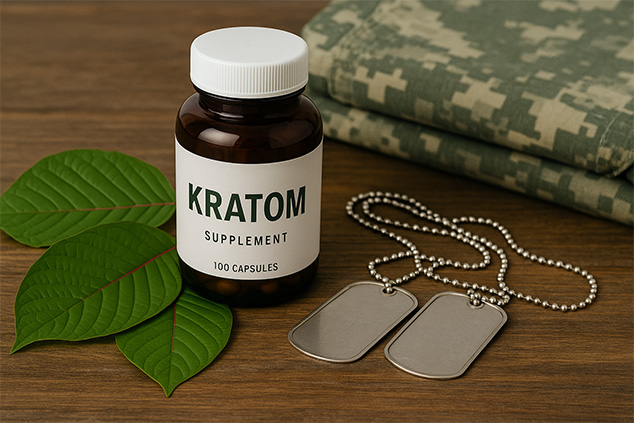US military members are well-known for their extraordinary abilities, strength, endurance, and capacity to go through rigorous training and extreme and life-changing experiences. As a result, many veterans suffer from handling pain, PTSD, anxiety, depression, sleep, and other health issues.
Therefore, it’s not uncommon for veterans to take kratom. The herb has many health benefits and can aid veterans in a wide variety of ways.
But what about active-duty members? There are many ways in which they could benefit from the herb. But can you take kratom in the military?
Can You Take Kratom in the Military?
Unfortunately, kratom is illegal to active duty military members in the United States. The Department of Defense (DoD) prohibits a wide range of substances that could negatively impact military readiness and performance and lead to possible disciplinary action.
The DoD based its reasoning for banning kratom in the military on the statements made by the FDA. It explains the reasons for prohibiting the herb as being the lack of evidence of safe use and deadly risks resulting from its use.
The military allows certain legal substances. These include prescription drugs, alcohol, and nicotine, provided that they are taken adequately and properly. However, the list of illegal substances is long. It includes actual drugs such as cocaine, LSD, heroin, and more, as well as other substances like steroids and smart drugs.
What Are Smart Drugs?
Smart drugs are a wide range of substances that have nootropic properties and can enhance cognition. This includes mediation. An example of such a smart drug includes Adderall, a common ADHD medication. It’s legal as long as the military member has a valid doctor’s prescription. Otherwise, it is off-limits.
Another class is so-called herbal smart drugs. Examples include cat’s claw, ashwagandha, L-theanine, green tea, piperine, Panax ginseng, and also kratom.
While most of those herbal smart drugs are OK in the military, kratom is an exception. The military prohibits it because, according to its words, it alters mood and function.
What Else Does the Military Forbid?
Kratom in the military isn’t an odd exception. In addition to the herb and substances that are already illegal in the US, the military also forbids the following substances and dietary supplements:
- Acacia rigidula, also known as blackbrush acacia or chaparro prieto – a dietary supplement that aids weight loss is illegal in the military due to the lack of evidence for safe use,
- Aconite or wolfsbane – homeopathic medicine that can also be poisonous,
- Cannabidiol or CBD – used for anxiety, stress, inflammation, and pain relief, illegal due to service policies,
- Hemp or hemp oil – used for stress and pain relief, illegal due to a DoD policy,
- Phenibut – a supplement used for anxiety and stress relief, illegal because it’s a synthetic substance that does not meet the standards of a dietary supplement,
- Salvia – a supplement that produces relaxing effects in small doses and hallucinogenic effects in large doses, also illegal in the military.
Besides these supplements, the military also forbids a long list of synthetic dietary supplements. These include HCG (Human chorionic gonadotropin), HGH (Human growth hormone), IGF (Insulin-like growth factor), and others.
Does the Military Test for Kratom?
Kratom is an illegal substance in the military and on the DoD forbidden substances list. So, active duty military members can be subject to illegal substance screening. Kratom, however, is unlikely to come up in a routine DoD drug test because most standard tests such as SAHMSA-5 do not test for it.
Nonetheless, it’s not a guarantee that you won’t be tested for kratom in the military. Changes are continuously happening.
In 2017, the DoD announced that it will be expanding its testing to detect 26 illegal substances that active-duty members are tested for in military applicants as well, making substance screening more rigorous. The list included drugs such as cocaine and heroin as well as a range of synthetic cannabinoids or spice.
While kratom wasn’t mentioned in the list, certain military members have reported that their divisions have started testing for kratom, as well.
Therefore, it’s best to abstain from taking kratom in the military. Even if your unit does not currently test for kratom, this can change at any time. This can put you at unnecessary risk if you take the herb while on deployment.
Active duty members are subject to drug testing three times a year and this occurs at random. Kratom alkaloids remain in the system and can come up on a urine drug test for up to 7-9 days. With this in mind, you cannot prepare for a kratom drug test.
And even if kratom isn’t among substances a drug test screens for, there have been instances of it resulting in a false positive. This can be an unnecessary and highly damaging risk for active-duty members.

Is Kratom Safe?
The DoD bases its judgment of kratom on statements by the FDA. Thus, it should come as a surprise that the military questions its safety. It mentions the side effects of kratom, including death, and the risk of it being laced with other substances like opioids.
The DoD also claims that kratom is addictive while its 8-Factor Analysis states the opposite, saying that kratom is no more addictive than coffee, a plat from the same plant family as kratom that is legal in the military.
Contrary to the FDA claims, the safety concerns regarding kratom use are exaggerated. Kratom deaths that it cites as proof of its deadly effects are misinformation. None of the “kratom deaths” had conclusive results and other substances with deadly effects were present.
Final Words
While kratom is prohibited to active duty military members, it’s legal in most states when one is out of the military and no longer serving. Kratom has numerous benefits that can help veterans lead better lives.
Regardless of that, it is important to always get high-quality raw kratom products from a trusted vendor.
While most claims by the FDA and DoD are untrue about kratom, one thing however is possible. That’s the fact that kratom can be contaminated or adulterated by other dangerous substances. To avoid that, one should always purchase kratom that has been accurately and properly tested, processed, handled, and labeled, preferably from US states with an active Kratom Consumer Protection Act.
Are you an active-duty military member or a veteran? Have you ever tried kratom? And most importantly, thank you for your service.



Leave a Reply